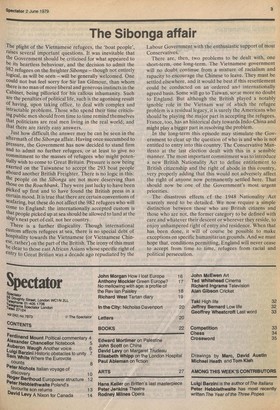The Sibonga affair
The plight of the Vietnamese refugees, the 'boat people', raises several important questions. It was inevitable that the Government should be criticised for what appeared to be its heartless behaviour, and the decision to admit the 982 refugees on the freighter Sibonga — though not entirely logical, as will be seen — will be generally welcomed. One could not but feel sorry for Sir Ian Gilmour, than whom there is no man of more liberal and generous instincts in the Cabinet, being pilloried for his callous inhumanity. Such are the penalties of political life, such is the agonising result Of having, upon taking office, to deal with complex and intractable problems. Those who spend their time criticising public men should from time to time remind themselves that politicians are real men living in the real world; and that there are rarely easy answers. Just how difficult the answer may be can be seen in the aftermath of the Sibonga affair. Having once succumbed to Pressure, the Government has now decided to stand firm and to admit no further refugees, or at least to give no CUmmitment to the masses of refugees who might potentially wish to come to Great Britain. Pressure is now being exerted on the Taiwanese to accept the 293 boat people aboard another British Freighter. There is no logic in this: the people on the Sibonga are not more deserving than those on the Roachbank. They were just lucky to have been Picked up first and to have found the British press in a certain mood. It is true that there are certain conventions of seafaring, but these do not affect the 982 refugees who will Come to England: the internationally accepted custom is that people picked up at sea should be allowed to land at the Ship's next port of call, not her country. There is a further illogicality. Though international Custom affects refugees at sea, there is no special debt of ubsPitality towards the Vietnamese (or Vietnamese Chinese, rather) on the part of the British. The irony of this must be clear to those east African Asians whose specific right of entry to Great Britian was a decade ago repudiated by the Labour Government with the enthusiastic support of most Conservatives.
There are, then, two problems to be dealt with, one short-term, one long-term. The Vietnamese government will no doubt continue from a mixture of racialism and rapacity to encourage the Chinese to leave. They must be settled elsewhere, and it would be best if this resettlement could be conducted on an ordered and internationally agreed basis. Some will go to Taiwan, so-.1e more no doubt to England. But although the British played a notably ignoble role in the Vietnam war of which the refugee problem is a residual legacy, it is surely the Americans who should be playing the major part in accepting the refugees. France, too, has an historical duty towards Indo-China and might play a bigger part in resolving the problem.
In the long-term this episode may stimulate the Government to clear up the question of who is and who is not entitled to entry into this country. The Conservative Manifesto at the last election dealt with this in a sensible manner. The most important commitment was to introduce a new British Nationality Act to define entitlement to British citizenship and the right of abode in this country, very properly adding that this would not adversely affect the right of anyone now permanently settled here. That should now be one of the Government's most urgent priorities.
The disastrous effects cf the 1948 Nationality Act scarcely need to be detailed. We now require a simple distinction between those who are British citizens and those who are not, the former category to be defined with care and whatever their descent or wherever they reside, to enjoy unhampered right of entry and residence. When that has been done, it will of course be possible to make exceptions on specific humanitarian grounds. And we must hope that, conditions permitting, England will never cease to accept from time to time, refugees from racial and political persecution.






































 Previous page
Previous page